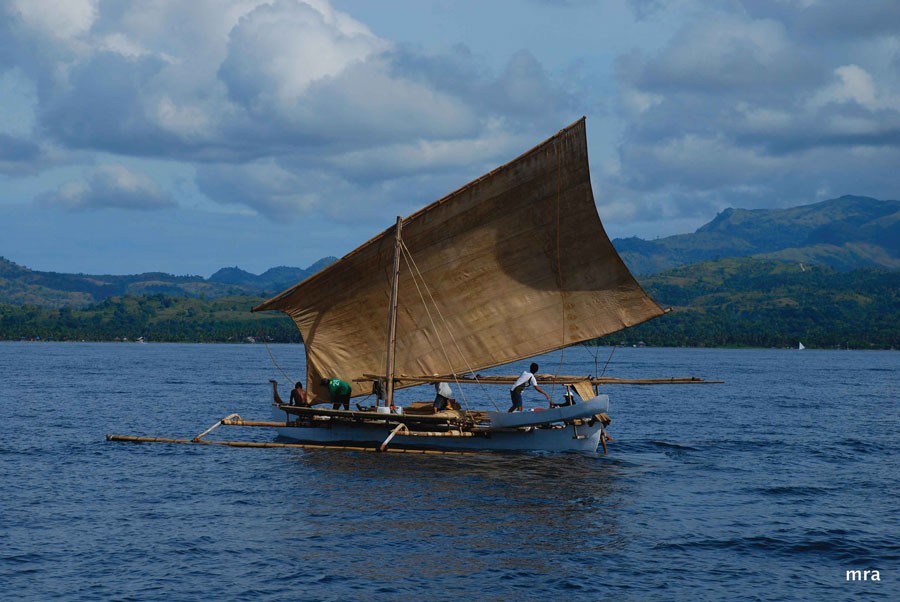Popular Reads
Top Results
Can't find what you're looking for?
View all search resultsPopular Reads
Top Results
Can't find what you're looking for?
View all search resultsSriwijaya’s trick of the trade in maintaining maritime sovereignty
A lot of Indonesians might remember these lyrics, taken from a folk song typically taught to elementary schoolchildren. The song could very well refer to the ancient kingdom of Sriwijaya in Sumatra.
Change text size
Gift Premium Articles
to Anyone
The ancient kingdom of Sriwijaya maintained a successful society that depended almost entirely on the ocean.
Nenek moyangku orang pelaut
Gemar mengarung luas samudra
Menerjang ombak tiada takut
Menempuh badai sudah biasa
(My ancestors were the sea people
Who passionately navigated the vast oceans
Fearlessly braving the mighty waves
Having been used to surviving storms)
A lot of Indonesians might remember these lyrics, taken from a folk song typically taught to elementary schoolchildren. The song could very well refer to the ancient kingdom of Sriwijaya in Sumatra. Originating in now Palembang, South Sumatra, the kingdom rose to power in the seventh century and retained control over the trade of an abundance of spices in the archipelago for around 500 years thanks to its strong navy.
Sriwijaya thrived by maximizing the potential of the sea, utilizing its resources, trade routes and suku laut (sea tribes) as the kingdom’s manpower in running its business operations.
The suku laut resided near the shallow waters of Sumatra, with each nuclear family possessing their own boats. They held various jobs to earn their living. The good ones caught fish in the ocean while the dishonest ones were notorious pirates.
The Maluku Islands were home to lucrative spices such as cloves, nutmeg and mace. The middlemen memorized the routes to the island and carefully kept them a secret from Europeans as well as traders from other Asian and Middle Eastern countries. Therefore, Sriwijaya became a port where traders from all over the world gathered.
“Aside from spices, traders from Persia [now Iran], India and China also came to Sriwijaya to deposit their goods. The Persians sold glass bottles and fragrances while the Chinese traded porcelains and ceramics as their primary commodities. The Indians, meanwhile, traded metal ornaments,” National Archaeology Center researcher Bambang Budi Utomo said.
He said that, although many traders and foreign ships entered Sumatran waters during the period of Sriwijaya control, the kingdom never once compromised its maritime sovereignty because of the strong manpower it wielded.
“Many Sriwijaya kings then “tamed” the pirates and turned them into ocean patrollers. According to accounts written by Chinese traders, the suku laut were greatly feared by the international traders because they were reputed to be great warriors, both at sea and on land,” Bambang said.
The legacy of the suku laut lasted longer than Sriwijaya, as they were a formidable force to those who challenged them. One Dutch ship, for example, was besieged by the suku laut when they entered what is now the Bangka Belitung area in Sumatra in around the 18th or 19th century, according to Bambang.
“They turned the ship upside down,” he said.
Currently, the Indonesian government has its sights set on strengthening Indonesia’s identity as a maritime country as part of President Joko “Jokowi” Widodo’s Nawacita (nine key programs). Protecting maritime sovereignty is an important element to this vision.
Since the demise of the Sriwijaya kingdom in around the 12th century, when its naval forces were attacked and destroyed by the ancient Chola dynasty of South India for imposing high taxes on traders, Indonesia seems to have lost its maritime strength.
Many ships, for instance, have intruded into the country’s waters, poaching fish and causing local fishermen to suffer from depleting resources.
Maritime Affairs and Fisheries Minister Susi Pudjiastuti implemented tough policies to deter illegal fishing. Within the last two years, the minister has sunk 317 fishing boats. Just last week, Susi announced that she would issue an instruction to sink 100 more foreign ships for allegedly conducting illegal fishing activities in Indonesia’s maritime region, tempo.co reported.
The minister’s policies have been criticized as “megaphone diplomacy” by certain observers, but they do bring to mind the fierceness of the Sriwijaya’s sea people.
The tough approach is also accompanied by other policies, such as those on combating destructive fishing practices by using proper fishing gear.
“Within just a period of more than two years, our fish stock has increased from 6.5 million tons [in 2014] to 12.5 million tons,” she said, adding that the increase impacted the livelihood of local fishermen.
She said the nilai tukar nelayan (fishermen’s purchasing power) index increased to 110 from 105 in 2014 despite the inflation thanks to the bigger fish stocks.
Bambang suggested that Indonesia’s modern-day sea tribes be empowered and involved in the Navy’s effort to protect the county’s maritime sovereignty.
“Now, we only involve around one percent of our total suku laut population to guard our oceans,” he said.
— JP/Sebastian Partogi











